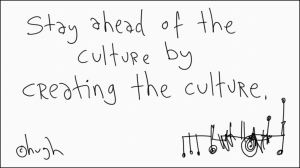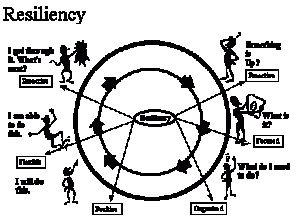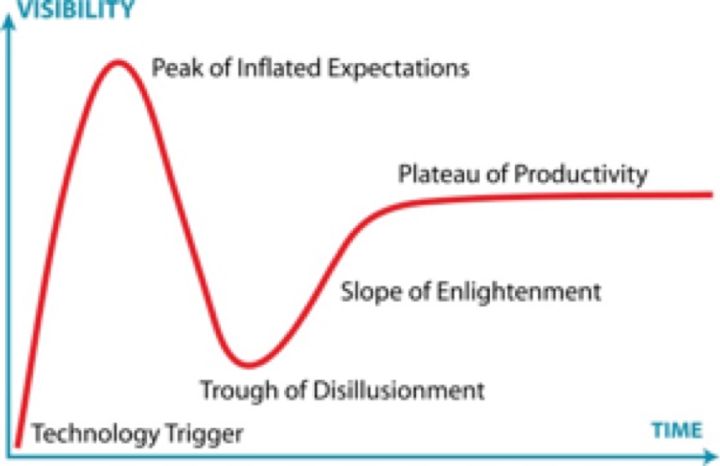We just finished our Lean LaunchPad class at UC Berkeley’s engineering school where many of the teams embedded machine learning technology into their products. It struck me as I watched the teams try to find how their technology would solve real customer problems, is that machine learning is following a similar pattern of previous technical infrastructure […]
startup
Product Management in a Large Company
It’s been a year of my product journey at a large company.Below are my thoughts about the same.
Company
Large companies definitely look for team players. In my experience as a PM at a large company, I’ve seen the absolute importance of prioritizing the success of the team over what someone individually wants. This makes a lot of sense because as the size of the team gets bigger, the total contribution of the team is much more than the contributions of a single person.
I think one of the most important skills a PM can have at a large company is strong communication. By strong I don’t mean forceful – the best PMs I’ve seen at my company have been clear communicators who are good at aligning and connecting different groups, visions, and ideas. Having mental toughness and flexibility goes a long way to delivering the final product when there are 20 differing viewpoints and voices.
Good
I think it’s very fair to say that larger companies, especially public companies, tend to focus on growing what is already successful. Also,most of them are willing to spend in new areas of Business.

Not so good
One of the more frustrating aspects of PMing at a large company is the sheer number of people involved in decision making. For a given project blockers tend to happen because there are so many people owning different parts that there’s inevitable delay and gaps in communication.

People(Top Bosses) here doesn’t have the necessary skills to lead Tech projects and often end up creating a me-too product,with no product differentiation . With this, The “classic” growth formula(build a product, spend a million bucks in PR campaign, additional million in FB and Google ads) doesn’t work.
What are the most important points in a co-founder agreement for a startup?
Answer by Jason M. Lemkin:
Vesting.
The most important thing is vesting.
You’ll be tempted to give yourself lots of credit, lots of upfront vesting, no cliff, to protect against the future. Against the VCs. Against the acquirers. Against the unknown that will try to Steal Your Stock later. Against the whatever.
But it will turn out, lots of times, co-founders don’t work out. (Far more often that your stock is “stolen”). Your commitments, for whatever or no reason, don’t end up being equal. At least not 1, 2, 3, 4 years down the road. And as a result, the less committed founder will end up with way too much stock. Lots of times.
If you are the most committed founder, it’s in your interest to have the longest vesting schedule with the least vesting upfront and a true cliff.
Even if it seems otherwise.
Graph from here: Equity Vesting Schedules for S&P 1500 CEOs – Equilar
What separates the top 10% of startup CEOs from the rest?
here are the main points
- Good at hiring AND firing. Whenever you find a really great CEO you find someone who has a knack for hiring. That means selling other people on your dream or your business. Especially when it doesn’t seem all that important or seems very risky. I used to work for a CEO who was awesome at hiring, but couldn’t fire anyone. Doomed the business. Many of the best CEOs get others to follow no matter what.

- Builds a culture, not just a company. The best CEOs, like Tony Hsieh at Zappos, build a culture that gives everyone a mission. They stand out in a sea of boring companies.

- Listens and acts. Many CEOs want to tell you what they are doing, but the best ones listen to feedback, and, even, do something with that feedback. My favorites even give credit back. Mike McCue, CEO of Flipboard, tells audiences that I was responsible for a couple of key features.

- Is resilient. AirBnB took 1,000 days for its business to start working. Imagine if they gave up on day 999? The best CEOs find a way to dig in and keep going even when it seems everything is going against them.

- Has vision. Let’s be honest. There are a lot of nice CEOs but if you don’t have the ability to build a product that matters to people, then no one will remember your name. Can you see a way to make billions with wearable computers? I guarantee some can and they are the CEOs who will bring me interesting new products.
- Stays focused. A friend who worked for Steve Jobs told me that what really made him different is that Jobs wouldn’t let teams move off their tasks until they really finished them.
- Speaks clearly. A great CEO is clear, crisp, concise. Quotable. So many people just aren’t good at telling a story in a way that’s easy to remember. The best are awesome at this. Since it’s the CEO’s job to tell the company’s story, it’s extremely important that this person be able to clearly tell a story about the company and the product.

- Is a customer advocate. The best CEOs understand deeply what customers want and when they are making anti-customer choices.
- Good at convincing other people. CEOs have to deal with conflicting interest groups. Customers often want something investors don’t. So, a good CEO is really great at convincing other people to get on board, even at changing people’s opinions.

Extra credit if you are:
- Nice. Yeah, Steve Jobs wasn’t always nice. But he was an exception in many ways. People remember assholes and try to avoid them. That’s not something that’s easy to work around.
- A builder. Yeah, you can be a CEO if you aren’t a builder, but you are swimming up stream. It’s one reason I haven’t run my own business. The CEOs that seem to work the best are ones who COULD write some code, or build a new design using a 3D printer.
- Integrity. The best CEOs are survivors and it’s really hard to survive if you have dirt in your closet or treat people differently behind closed doors than you do in public.
Related articles
- Being A Great CEO (feld.com)
- Downtown Las Vegas Revitalization Brings Business, Jobs and Residents (local.allstate.com)
- CEO News | Announcing CEO.com | News for CEOs | Blog (domo.com)
- Elance CEO Fabio Rosati Pens Forward To Best-Seller, Rise Of The Naked Economy. (elance.com)
- Is Elon Musk the new Steve Jobs? (smartplanet.com)
- Apple Inc. (AAPL) In Trouble Without Steve Jobs? (etfdailynews.com)
playing the name game
Naming the business can mean hours agonising before finally making a decision. Do have fun when choosing a name for your business,but make sure you can tell it to your friends without giggling.
here’s an idea for you……
- Draw up a shortlist of ten names for your business.Now get as many other people as you can to put your list into their preferred order.Is there an overall favourite? You should see a pattern forming and if your pollsters are willing to expand on the rationale for their choice,you might better understand why your own choice is great or even a potential disaster.Remember, names are incredibly subjective and you the business owner do and should have the final say on what name to go for – but do listen to your potential customers and clients.
2. Naming a business is the first step to creating a brand. Big,bold and a little bit cheeky.
3.“condense some daily experience into a glowing symbol,and an audience is electrified.”- RALPH WALDO EMERSON
“we do what we must, and call it by best names”
An obscure name is not necessarily a bad one ,especially if it is memorable. I doubt that many people know that ‘nike’ means ‘victory’ in greece,but look at how wonderful & powerful that name and business has become. A good name becomes the business and even a brand in its own right.If you like the name, go with it.



